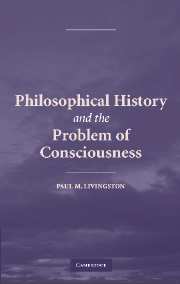Book contents
- Frontmatter
- Contents
- Preface
- Acknowledgments
- 1 Introduction: Philosophical History and the Problem of Consciousness
- 2 Structuralism and Content in the Protocol Sentence Debate
- 3 Husserl and Schlick on the Logical Form of Experience
- 4 Ryle on Sensation and the Origin of the Identity Theory
- 5 Functionalism and Logical Analysis
- 6 Consciousness, Language, and the Opening of Philosophical Critique
- Notes
- Works Cited
- Index
6 - Consciousness, Language, and the Opening of Philosophical Critique
Published online by Cambridge University Press: 16 July 2009
- Frontmatter
- Contents
- Preface
- Acknowledgments
- 1 Introduction: Philosophical History and the Problem of Consciousness
- 2 Structuralism and Content in the Protocol Sentence Debate
- 3 Husserl and Schlick on the Logical Form of Experience
- 4 Ryle on Sensation and the Origin of the Identity Theory
- 5 Functionalism and Logical Analysis
- 6 Consciousness, Language, and the Opening of Philosophical Critique
- Notes
- Works Cited
- Index
Summary
The contemporary discussion of the problem of consciousness, interesting in itself, conceals what might prove to be the most important contribution of analytic philosophy to philosophical history. This contribution is the explicitly linguistic development of a philosophical understanding of ourselves through reflection on the language of consciousness. The tradition of analytic philosophy has comprised a set of characteristically linguistic practices and programs of explanation and analysis, programs that make sense of and support our ability to understand the world and ourselves by clarifying the concepts, terms, and propositions with which we do so. As I have attempted to show in the last four chapters, the contemporary discussion of the problem of explaining consciousness manifests an enduring and repeated problem for these methods as they have ordinarily been understood, a problem that can be clarified only by examining the methodological presuppositions that have dictated the specific forms of analysis characteristic of analytic philosophy at several moments of its history. The investigation of philosophical history reveals the genuine sources of the contemporary problem of consciousness in the analysis of the language that expresses it. This paves the way, in turn, for a future discussion that better satisfies the actual needs that have historically generated and continue to drive the current debates.
In the history I have related, the discussion of conscious experience has consistently taken the form of a dialectical oscillation between the explanatory claims of theories of experience, grounded in particular analytic projects, and forms of resistance to these projects that cite it as unexplainable in their terms.
- Type
- Chapter
- Information
- Philosophical History and the Problem of Consciousness , pp. 195 - 236Publisher: Cambridge University PressPrint publication year: 2004



